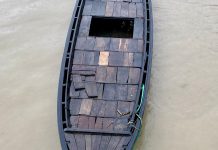Fog settled over the water. At the wharf, men in beach chairs watched. Sometimes they called themselves The Guardians of the Sea. Other times they were the President and Vice President of The No Coats; a society of retired insurance guys no longer obligated to wear the company blazer. Most times, though, they were Big Henry and Skinny Vin.
There were only 3 people in the No Coats. Missing Tim never showed. He had no use for uselessness. The No Coats never threw any fund raisers or put on bake sales. They had no actual agenda except sitting on the wharf not wearing blazers.
Henry, who looked like he’d been poured into his chair by a cement mixer, stared into the fog at a couple of blurry fishing boats. Skinny Vin, who wore a hat so wide, from a distance it looked like he was being surveilled by a flying saucer, was preoccupied by what was going on behind him; a gaggle of carnies working feverishly at putting up a ferris wheel, and looking more like hammer-wielding ants, drunk on their own pheromones, than workers. Vin laughed every time one of the carnies laughed. Other than the workers, the wharf was empty except for a lone sea gull the men called Oscar the Shunned. Oscar preferred the dock, far from the No Coats.
Henry spotted it bobbing in the shallows under the dock, snagged on a post. Henry saw things all the time, things no sane person ever would. He could spot a flea saddled to the back of a fly, something that probably cost him his marriage and any chance at normal friends.
To Oscar’s chagrin (whose loneliness felt like an anchor that day), Henry got up, waddled to the dock, walked to the edge, dropped to his knees and peered down.
“It’s a plastic bag,” he shouted to Vin, “…with something inside. Might be worth something.”
Henry thought every piece of junk might be worth something. It’s what kept the dance in his toes.
He sighed, though, and painfully got back to his feet, knowing exactly what he needed to do. He needed to consult with The Rat; a dirty little man with a dirty little mind who lived in an empty furnace next to the warehouse. Henry waddled over to the furnace and rapped hard on the side. The Rat emerged and they quickly made a deal.
The No Coats dragged their chairs over just to watch The Rat at work. He may have been a Rat but he was as agile as a squirrel. He shimmied down the dock post in an instant, scooped up the bag and brought it to Henry whose eyes were like a child’s at Christmas.
Henry plopped down in his chair, his new-found treasure on his lap, and began unraveling the wet plastic. Inside the bag was a large wooden box; a wine box, a 4 bottle size. Henry slowly opened it. Inside, tucked under some wet straw, was a violin; a stringless violin. Big Henry’s eyes glistened.
“Who would…?” Vin asked, standing over Henry’s shoulder.
“Don’t know,” Henry mumbled, wiping the violin with his sleeve.
“I knew men who made these,” he whispered, “Overseas, in France. I don’t know about this one. I’ll have to bring it to someone. Christ, I’d thought I’d forgotten.”
“You knew violin makers?”
“The luthiers?”
Henry looked up.
“Everyone knew the luthiers; old men who lived in the hills, the beautiful hills. The luthiers were our only hope sometimes, our only hope that there was still good in the world. They could make things that soothed the soul. That’s powerful. I remember thinking, back then, that God must protect men like these.”
He tested the strength of the violin’s neck.
“Most lived alone, had their shops in their homes; simple homes, made of stone, old stone, pouring their love into their instruments. Some were regular people. My God, I remember everything now.”
“I knew you were over-seas….”
Henry lifted the violin from the straw, pushed the box aside then set the violin in his lap, stroking it like a cat, then looking out at the fog again, trying to spot the boats.
“There was this one, he must have been 100, hands as soft as a child’s and eyes that were as blue as robin’s eggs. If I could paint, I remember thinking, I’d paint those hands, that luthier’s hands. If I could paint, I would have painted so many things. We became friends. We went to the same café.”
Henry’s face grew long.
“They bombed his village, bombed them all. We never saw him again, Pierre with the blue eyes. I knew then that God protects no one.”
Vin turned as a flat-bed carrying some merry-go-round horses rumbled around the corner and squealed to a stop. Carnies, laughing, ran over and hoisted the horses on their shoulders.
“Sometimes I wish I was a kid,” Vin said.
Henry smiled.
“See the pegs? Hand-carved, not perfect. The human hand isn’t perfect. It can never be as good as a machine, but the machine has a strange fate; a fate it can never get over. It’s not connected to a heart.”
Henry looked up.
“Out of the way Oscar. I have to track the boats.”
Vin looked out.
“Imagine working on a fishing boat. Out there all day, in the arms of something like that. I’ll bet the guys who work on fishing boats sleep like baby Jesus.”
Henry looked down.
“I need to get this home, clean it, rub the sea into the wood. That takes time. That brings out the music. Then it needs to air dry. The music’s still there. I know it.”
“What about the bow?”
“One step at a time.”
Henry looked into the fog.
“I’m back there again Vince, back in the square and the village is whole again. The luthiers are all there drinking at the café like nothing’s happened, like it’s the world before.”
“I don’t understand.”
“I can’t explain it. All those years of peddling insurance. I thought it had died, but I was wrong. I need to get this home. I need to work. So much to do.”
Vin took in the sea.
“You know those carnies are nuts, right? Every last one of them. I hope you’ve found a real treasure this time. I really do. Do you think if I paid those carnies, they’d give me a go at that merry-go-round?”
“I don’t think you’d have to pay ‘em,” Hank laughed trying to loosen a peg, “I think they’d ride it with you.”
They shared a laugh. Henry scratched the stubble on his chin.
“The café was like a postcard. We’d go there on the coldest days, in our uniforms. So young, so proud. I wished, so many times, I could paint it, capture it, bring it back and put it in my closet so I could take it out when I was old and alone like now, but I never could paint.”
“I’ve heard,” Vin said, “That everyone has a masterpiece in them.”
Henry nodded.
“The luthiers were beautiful, God’s men, and they killed them, killed every last one. When I touched the violin, I was there again. I wish you could see what I see Vincent.”
Vin laughed.
“It ain’t happening pal. When I close my eyes, I fall asleep. Doc says I have the narco-leperosy.”
Vin laughed.
“What do you say we rattle The Rat on our way out?”
Henry placed the violin on the straw as the carnies broke into dirty sea songs, then he got up, tucked the box under his arm and joined Vin. They walked away from the wharf. The sea was safe. The Guardians could rest.
“Better get right with the world!” Henry yelled to Oscar.
They stopped to bang on the furnace with a couple of broken broomsticks they pulled from a garbage can.
“Tomorrow,” Vince waved as he got into his car.
“Tomorrow,” Henry waved back.
After Vin pulled away, Henry stood by his car then turned again to face the sea. The boats had emerged from the fog into sun light.
About the Author

Joe Ducato lives in Utica, New York. Previous publishing credits include : Santa Barbara Literary Journal, Wild Violet Magazine, Strata Magazine, Avalon Literary Review, Bangalore Review and Sandy River Review among others.












